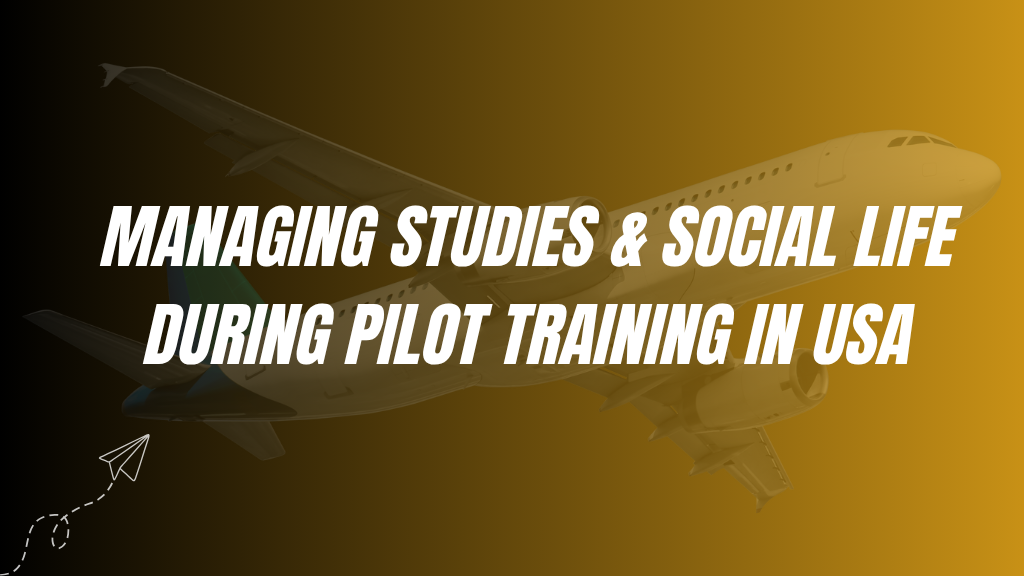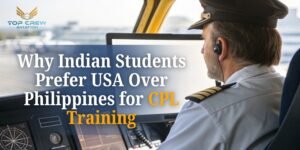Becoming a pilot in the USA is a dream for many, but it comes with a lot of hard work. The journey includes learning aviation theory, practicing flying in real aircraft, and preparing for exams. One of the biggest challenges students face is managing studies & social life during pilot training in USA. Balancing academics, flight training, and personal life can feel overwhelming, but with the right strategies, it’s possible to succeed in all areas.
In this guide, we will explore practical tips, daily routines, and advice from Top Crew Aviation, a leading aviation training institution, to help you maintain a balanced life while pursuing your dream career.
Understanding Pilot Training in the USA
Pilot training in the USA is a structured and intensive process. Programs are designed to give students both theoretical knowledge and practical flying skills. A typical pilot training program includes:
- Ground School: This is where students learn the theory of flying. It includes topics like aviation regulations, navigation, aerodynamics, meteorology, and safety procedures. Ground school can be challenging, and it requires consistent study to understand and remember important concepts.
- Flight Training: Students gain hands-on experience flying aircraft with instructors. Flight hours are mandatory, and students need to practice maneuvers, landings, take-offs, and emergency procedures.
- Exams & Self-Study: Students must prepare for FAA written exams, oral tests, and practical checkrides. This requires dedication, focus, and regular revision.
The combination of these components makes pilot training demanding. It’s not unusual for students to spend 6–8 hours a day studying, attending classes, or flying. This is why managing studies & social life during pilot training in USA is critical to avoid burnout and stress.
Why Balance Is Important
Many students focus solely on academics and flight training, neglecting their social life. While dedication is important, a lack of social interaction can lead to stress, fatigue, and decreased performance. Maintaining a social life while training has several benefits:
- Improves Mental Health: Regular social interaction reduces stress and anxiety.
- Builds Support Networks: Friends and peers can provide help, encouragement, and advice.
- Enhances Time Management Skills: Planning time for both study and leisure helps improve overall productivity.
Balancing studies and social life is not just about fun—it’s about performing better in training and staying healthy.
Read Also – Importance of Simulator Training in USA Flight Schools
Time Management Tips for Pilot Students
Good time management is the foundation of successfully managing studies & social life during pilot training in USA. Here are some practical tips:
1. Create a Weekly Schedule
Make a weekly plan that includes time for classes, flight training, self-study, and social activities. Assign specific blocks of time to each task and try to follow it consistently.
2. Set Clear Goals
Break large tasks into smaller, achievable goals. For example, instead of aiming to “study all aviation theory,” focus on “study weather patterns for 1 hour” or “review navigation charts for 30 minutes.” Small goals make tasks less overwhelming.
3. Prioritize Tasks
Use a priority system to focus on urgent and important tasks first. For example, preparing for a flight checkride should take precedence over casual reading.
4. Allow Flexibility
Flight training can be affected by weather, aircraft availability, or instructor schedules. Keep buffer time in your schedule to accommodate unexpected changes.
5. Use Technology
Apps and digital planners can help you track flight hours, study progress, and social commitments. Tools like Google Calendar or Trello are useful for creating reminders and managing tasks.
By planning carefully, students can make sure that their academic and personal lives are balanced.
Maintaining a Social Life During Training
Social life is often neglected during pilot training, but it is essential for overall well-being. Here are ways to maintain connections and enjoy downtime:
1. Join Student Communities
Participate in student clubs, aviation forums, or online communities. This is a great way to meet other pilots, share experiences, and get advice.
2. Schedule Social Time
Just like you schedule study or flight time, schedule social activities. Even a short lunch with friends or a movie night can make a big difference.
3. Explore Local Culture
If you are training in a new city, take time to explore local attractions, events, or outdoor activities. It’s a great way to relax and make new friends.
4. Engage in Hobbies
Sports, music, reading, or fitness activities provide a mental break from intense training and keep you energized.
Top Crew Aviation encourages social engagement through student events, group activities, and networking opportunities. This helps students form meaningful friendships and reduces stress while keeping them motivated in their training.
How Top Crew Aviation Supports Students
Top Crew Aviation is a well-known aviation training institution with a global presence, including the USA. They provide structured programs designed to help students balance their studies and social life. Key features include:
- Personalized Training Plans: Each student’s schedule is tailored according to their pace, flight hours, and study needs.
- Mentorship Programs: Experienced pilots guide students through difficult concepts and flight training, helping them manage stress and time effectively.
- Community Activities: Top Crew Aviation organizes social events and workshops to encourage networking and friendships among students.
By combining high-quality training with support systems, Top Crew Aviation helps students maintain a healthy balance between academics and personal life.
Extra Tips for Success
- Use Online Learning Platforms: Websites like King Schools or FAA digital resources can supplement your learning.
- Stay Organized: Keep track of flight hours, study materials, and social commitments.
- Take Care of Your Health: Eat well, exercise, and get enough sleep to maintain energy levels.
- Ask for Help: Don’t hesitate to reach out to instructors, mentors, or peers if you’re struggling.
Conclusion
Successfully managing studies & social life during pilot training in USA is possible with planning, discipline, and support. By following a structured schedule, engaging with peers, and leveraging guidance from Top Crew Aviation, students can enjoy a balanced life while completing their pilot training.
Remember, becoming a pilot doesn’t mean sacrificing your personal life. With the right strategies, you can achieve academic success, complete your flight hours, and still enjoy meaningful social experiences. Balance is the key to a successful and fulfilling pilot training journey in the USA.



